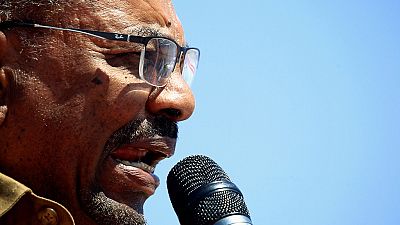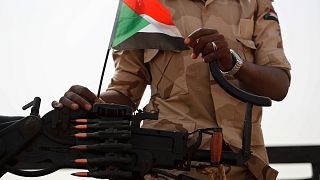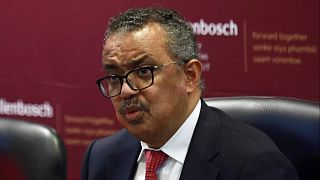Sudan
For weeks now, protesters in Sudan have challenged the authority of president Omar al-Bashir’s 30-year rule, demanding that he steps down, even as his party prepares to change the constitution to allow him to seek another term.
The protests began on Dec. 19 over soaring bread prices, one result of a deep economic crisis that started when the southern part of the country seceded after a referendum in 2011, taking oil wealth with it.
The authorities’ heavy-handed crackdown on the demonstrations has fuelled the anger. At least 24 people have been killed, officials say, and hundreds more have been injured. Activists say the death toll is at least 40.
READ MORE: Protesters soldier on despite crackdownBashir is defiant. The 75-year-old blamed the protests on foreign “agents” and challenged his opponents to seek power through the ballot box.
How the protests started
The protests began in Atbara, a city in northeastern Sudan known as a stronghold for anti-government activity. Several thousand people took to the streets after the government tried to end a bread shortage.
As a result of the measures, the price of some bread tripled and although there had been bread queues for months, people were angry about the price rise.
The authorities quickly changed the policy and scrambled to crush the protests, declaring a state of emergency in Atbara and imposing a curfew from 6:00 p.m. to 6:00 a.m.
But they had already spread to the Red Sea city of Port Sudan and to al-Qadarif in the south east, before reaching the capital Khartoum.
“It is not protests anymore. It’s almost a full-fledged revolution,” said Mohammad Osman, a Sudanese political analyst.
He said the scale of these protests is unprecedented. “Multiple constituencies are joining forces against Bashir’s regime in order to achieve radical change,” he said.
Protesters were also angered by cash shortages due to restrictions on withdrawals aimed at keeping money in the banks, which themselves are struggling to find cash.
From protesting prices to demanding regime change
But what started as a protest about living conditions has turned into one about the regime.
Echoing the 2011 uprisings that swept other Arab countries including Tunisia, Egypt, Syria and Bahrain, their common cry is: “The people want the regime to fall.”
Once seen as the breadbasket of the Arab world, the protesters say that many years of mismanagement have turned Sudan into a failed state.
They blame Bashir for South Sudan’s secession and for Sudan being placed on a U.S. list of countries that sponsor terrorism.
How serious are the protests?
The numbers in Atbara have dwindled from the initial thousands but hundreds now take part in near daily protests in other cities around Sudan, despite the crackdown. They are the most sustained under Bashir’s rule.
In September 2013, dozens of people were killed in a few days of protests sparked by a cut in fuel subsidies. Authorities put the death toll at 84 while rights groups said up to 200 people died.
In January last year, Sudan saw protests sparked by bread subsidy cuts, but they were short-lived.
“With the protests continuing for a fourth week…the situation is open to all possibilities,” said Abd al-Latif al-Bony, a political science professor at Khartoum’s National University.
“Each side is trying to totally cast out the other side, which is dangerous for the stability of the country.”
Should Bashir be worried?
Bashir has long been the uncontested leader in Sudan.
The opposition comprises several political parties whose leaders are in Sudan, and several armed groups led mainly from abroad or from conflict zones in southern or western Sudan.
Members of opposition parties have joined the protests which are mainly led by a little-known group of trade unionists called the Sudanese Professionals Association (SPA). With a weekly programme of demonstrations circulated on social media, the SPA has eclipsed the traditional opposition parties.
Bashir is the head of the Islamic Movement party, which has a similar ideology to the global Islamist organization, the Muslim Brotherhood.
He also has direct control over security forces, including the feared Rapid Support Force comprising former militias loyal to the ruling party, which he has often used to crush dissent.
But his position has been eroded by the economic crisis that sent inflation soaring to around 70 percent.
Bashir’s supporters fear the protests may embolden small but influential factions within the ruling party who oppose changing the constitution to allow the president to seek a new term in office in 2020.
ALSO READ: Khartoum backers maintain support as anti-Bashir protests growPost-Bashir scenarios
Since independence in 1956, autocrats blamed for some of Sudan’s worst woes have come to power through military coups. The military also stepped in at least twice, in 1964 and 1985, to back popular uprisings for change.
But over the past 30 years, Bashir has sought to fill key army posts and those in various security apparatus with members of his Islamic Movement.
Still, Sudanese opposition parties look to the army as an acceptable body to lead any transitional period until new elections were organised.
While military officers who had brought positive change to Sudan in the past were not public figures, Bashir’s deputy, Bakri Hassan Saleh, a former army general could step in to fill any vacuum left by the president.
Local experts say that the intelligence chief, Salah Abdallah Mohamed Saleh, also known as Salah Gosh, an Islamist with huge influence in Sudan, was another likely candidate but he does not have a military background and that could limit his chances.
Experts say the worst scenario would be a mutiny or a split in the armed forces if the army is asked to crush the protests.
They say that Bashir, facing the prospect of a trial at the International Criminal Court in the Hague as a war criminal for alleged crimes against humanity in Darfur, will likely resist any attempt to force him to step down, which would put Sudan at risk of a new civil war.
Sudan’s delicate geopolitical strategy
Sudan was long isolated by U.S. economic and trade sanctions first imposed in 1997, shortly after the country harboured Osama bin Laden. The sanctions were lifted in October 2017.
Bashir has sought better relations with the United States by offering security cooperation but has also courted Russia.
He has sent troops to shore up a Saudi-led Arab alliance trying to curb Iranian influence in Yemen. However, Saudi Arabia and the United Arab Emirates have been slow to deliver aid to Sudan, suspicious of his ties to their Gulf rival Qatar, and to Turkey, which has a foothold on Sudan’s Red Sea island of Suakin.
Sudan is also a key player in the Horn of Africa, an area where international powers are competing for influence.
A sprawling country of some 40 million people, it is also a key transit route for African migrants seeking to reach the Mediterranean on their way to Europe.














Go to video
Almost 300 killed in wave of violence in Sudan’s North Kordofan
Go to video
ICC warns of a dire humanitarian crisis in Sudan as the war rages on
01:05
Ethiopia's mega-dam on the Nile is "now complete", Prime Minister says
01:49
Sudanese refugees in Chad face deepening humanitarian crisis
01:41
UN warns of looming famine in Sudan, Gaza and 3 other global hunger hotspots
01:49
UN warns of impact Sudan's humanitarian crisis is having on Chad